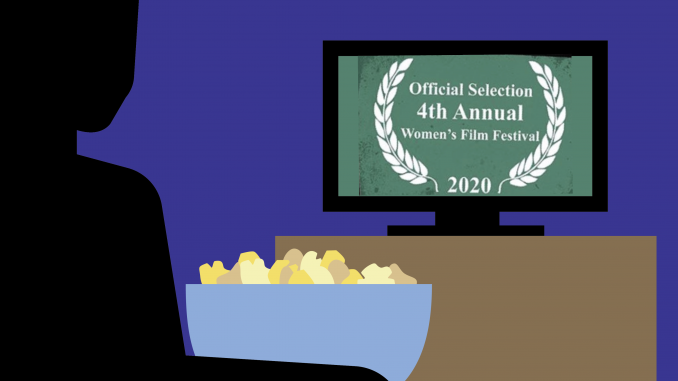
Connor Frame was nervous when concerns about COVID-19 led the School of Theater, Film and Media Arts to cancel its events in accordance with the Temple University’s response to the outbreak.
She had been selected as one of 10 finalists to be featured in the fourth year of Women’s Fest, an annual film festival featuring works of Temple female and nonbinary filmmakers.
“Being accepted to the film festival was one of the only good things that happened to me this year and now that was being taken away from me,” said Frame, a senior film and media arts major.
Frame, like many of the filmmakers selected, feared her film would never see the light of day.
But student film group Mise-En-Femme and the Diamond Screen Film Series ensured that the show would go on. On March 18, for the first time the Women’s Fest and for Diamond Screen, screened all 10 short films online via Vimeo.
Juli Jackson, second-year MFA student and co-director of the Diamond Screen Film Series, said it was important to keep the film festival going to continue to provide a space to celebrate the talents and identities of women and non-binary filmmakers.
“Historically, the stories of and films by women and other marginalized groups have not been given the same exposure in the industry as male counterparts,” she said.
Catara Lane, a junior film and media arts major, felt it was important for untold stories, like that of her film, to still be given a platform even if it’s online.
She directed “Wins and Losses,” the fest’s sole documentary feature. It followed the trials and triumphs of Lane’s students who competed in citywide competitions for their Scrabble club. She was glad that a story focused on minority teachers and students was highlighted in the festival.
“Teachers generally don’t get enough credit, and minority voices are underrepresented, so it’s nice to get that story out there,” Lane said.
Chloé Rossetti, a second-year MFA student, was also glad to still be able to provide nonbinary and queer representation through their film, “Valentine’s Day After.”
The film was a snapshot of everyday life that they feel is lacking in mainstream depictions of the queer and nonbinary communities, Rossetti said.
“In marginalized communities, we become like weird drama fodder, or we have to first talk about the ways in which we’ve been hurt in order to just exist at all,” they said.
In order to combat this idea, Rossetti’s film centered around a group of friends in order to show that queer and nonbinary lives can be full of “radical joy,” Rossetti said.
“I just think that joy is kind of at the very heart of humanity and life and all things so when we’re in a joy state we’re very connected to life,” they added.
For some, the festival’s move to the online format was bittersweet.
Lauren Schwartzbard, a sophomore film and media arts major, had been incredibly excited to experience her first film festival as a featured filmmaker.
“When I found out [I had been selected], I took a screenshot of the email and I sent it to my parents, and I was like, ‘Oh my god!” she said.
While she missed out being able to live-screen her film, “Alone with Myself in the Garden,” she was glad that all the films were still able to be showcased despite the circumstances.
“Some of my relatives who are pretty far away that wouldn’t have been able to come out to see it live can at least see all the videos, so it may not be the ideal plan, but I was happy to at least something was coming out of it,” she said.
Screening the films online also allowed viewers a chance to cast their vote for their favorite film. Frame, who won the festival’s Audience Award for her horror/comedy “Escape Duo,” spent the day of the festival sharing the link with family and friends.
While Frame knew the experience would be different than the typical live experience, she was still excited and relieved that the festival had been moved online. For her, it was important that she and her fellow filmmakers still get their time to shine.
“Just because there’s a pandemic going on doesn’t mean we still couldn’t find other methods in order to take over for one day,” she said.
Chen-Yi Wu, a third-year MFA student, won the Mise-En-Femme Award for her film, “The Falling Lovers.” It was one of two animated projects featured. She was happy to be able to share the festival with her friends and family in Taiwan and to still be able to support her fellow filmmakers, she said.
“Women’s Fest is a platform that provides opportunities to those who used to have less chance to express themselves in public,” she added.
Lindsay Allen, Mise-En-Femme president and senior film and media arts major, said the ability to continue the festival online speaks to the determination and willingness of everyone involved in the festival.
“Despite being in different states, slow connection, or whatever it may be, we all wanted to see this happen and worked hard to make sure it did,” she added. “I think it captures the essence of Women’s Fest and how, no matter what, we will prevail.”


Be the first to comment